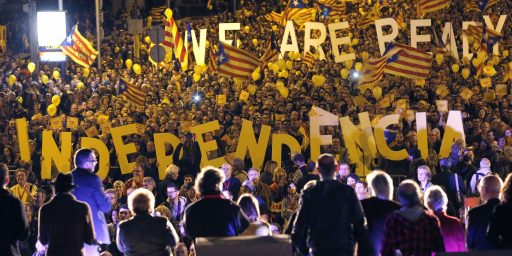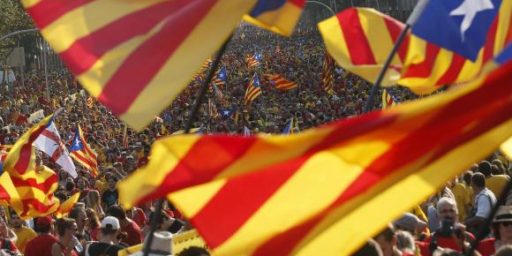The Lessons of WWII
Mark Steyn compares American and European attitudes toward terrorism:
For more than a week now, American friends have asked me why 3/11 wasn’t 9/11. I think it comes down to those two words you find on Holocaust memorials all over Europe: “Never again.” Fine-sounding, but claptrap. The never-again scenario comes round again every year. This very minute in North Korea there are entire families interned in concentration camps. Concentration camps with gas chambers. Think Kim Jong-Il’s worried that the civilised world might mean something by those two words? Ha-ha.
How did a pledge to the memory of the dead decay into hollow moral preening? When an American Jew stands at the gates of a former concentration camp and sees the inscription “Never again”, he assumes it’s a commitment never again to tolerate genocide. Alain Finkielkraut, a French thinker, says that those two words to a European mean this: never again the führers and duces who enabled such genocide. “Never again power politics. Never again nationalism. Never again Auschwitz” – a slightly different set of priorities. And over the years a revulsion against any kind of “power politics” has come to trump whatever revulsion post-Auschwitz Europe might feel about mass murder.
That’s why the EU let hundreds of thousands of Bosnians and Croats die on its borders until the Americans were permitted to step in. That’s why the fact that thousands of Iraqis are no longer being murdered by their government is trivial when weighed against the use of Anglo-American military force required to effect their freedom. “Never again” has evolved to mean precisely the kind of passivity that enabled the Holocaust first time round. “Neville again” would be a better slogan.
While perhaps a bit overstated, this is essentially right. Western Europe, with the exception of British Tories, emerged from WWII with a reflexive pacificism. For them, almost anything is more tolerable than the horrors of war. Americans–who, to be fair, entered the war late and suffered far less devastation–emerged from the war with a renewed sense that military power is the only effective way to deal with tyrants.
We Americans haven’t exactly been heroes in the cause of “never again.” Yes, we ultimately intervened in the former Yugoslavia–but only after years of killing. And we turned a blind eye to genocide all over the Third World even after the Holocaust–Rwanda, then-Zaire, Uganda, Biafra, Burundi, and Cambodia come quickly to mind. The constraints of the Cold War are a partial explanation for those cases, of course. But democratic societies have a natural aversion to dying in wars that don’t serve their national interests in some way beyond simple humanitarian reasons. Still, we’ve used military force a remarkable number of times in the support of the freedom of others when there was a tie to our broader policy goals–Korea, Vietnam, El Salvador, Grenada, Kuwait, Kurdistan, Somalia, Haiti, Bosnia, Kosovo, Afghanistan, and Iraq come to mind without much effort. While some of those interventions seem rather dubious in hindsight–as indeed many wars do–they mark a contrast with the actions of non-Commonwealth democracies.
Ralph Peters sounds a somewhat harsher tone.
Yesterday, European leaders reflexively attacked Israel for killing the founder of Hamas – a man bathed in the blood of innocents.
Don’t be misled. Their rhetoric simply reflected the continent’s cherished tradition of anti-Semitism, not its changing attitude toward terrorism. Jews still have no right of self-defense, but the Europeans are starting to see that America’s War on Terror just might be their own fight, after all.
***
The Madrid bombings didn’t quite have a 9/11 effect on the continent. But they sobered many who had intoxicated themselves with the illusion that Islamic terrorists would not target Europeans and – despite global evidence to the contrary – that al Qaeda was an anti-American phenomenon aggravated by Washington’s blundering.
Of particular interest was the dramatic shift in European editorial opinion as the week progressed. In the immediate aftermath of the bombings, there was a hideous degree of satisfaction that the Aznar government in Madrid had been paid back for siding with Washington. On the eve of the Spanish elections, the tone in Munich’s Sueddeutsche Zeitung, the newspaper favored by Germany’s literate leftists, was nothing short of disgraceful.
But by the end of the week, the same paper’s editorial line claimed that international terrorism was a threat to all. Cooperation – even with those boorish, ham-handed Americans – was essential.
German pundits are not about to sign up for duty in Baghdad, but that smug editorial board’s realization that the Oktoberfest might be a future target was an intellectual breakthrough just short of divine revelation.
***
It’s no accident that terror cells have flourished in Europe, not the United States. In America, Muslim immigrants have a chance to succeed. In Europe, they meet only poverty, discrimination and humiliation. The Europeans hoped that no one would notice.






Peters’ column is so off-the-mark it’s almost scary. Madrid bombing certainly sobered a lot of Spanish voters – you saw the results.
Simple question, why Spain was bombed: a) because it’s a european country or b) because it’s a euro-country supporting USA in Iraq? The answer is B.
Next question: how come we didn’t see more attacks in Europe *and* USA since 9/11? Answer: because there is some sort of prevention going on all over the place. Not a month has gone by that we haven’t heard of some arrests, or cells discovered, or alarms, or whatever – both in Europe *and* North America.
Next question: has the invasion of Iraq impacted on these world-wide activities and in what way? Obviously, it did not prevent any of the goings on in Europe *and* N.America. It did however channel a lot of these goings-on towards countries directly supporting this action. That’s about all it did regarding terrorist activities (whether it scared the hell out of North Korea is another matter).
Lastly, this claim about how it is so much easier to recruit Muslims in Europe than in N.America because of descrimination. This is skewed. European Muslims have closer links with fundy groups in the Middle East because, most glaringly, they’re geographically closer – and borders are so much more permeable in EU. Take a trip, bring a bomb. Those guys in Spain were Marroccans.
I mean, I understand this is pundit-land. But hey – you can’t just say *anything* and be happy 🙂
—